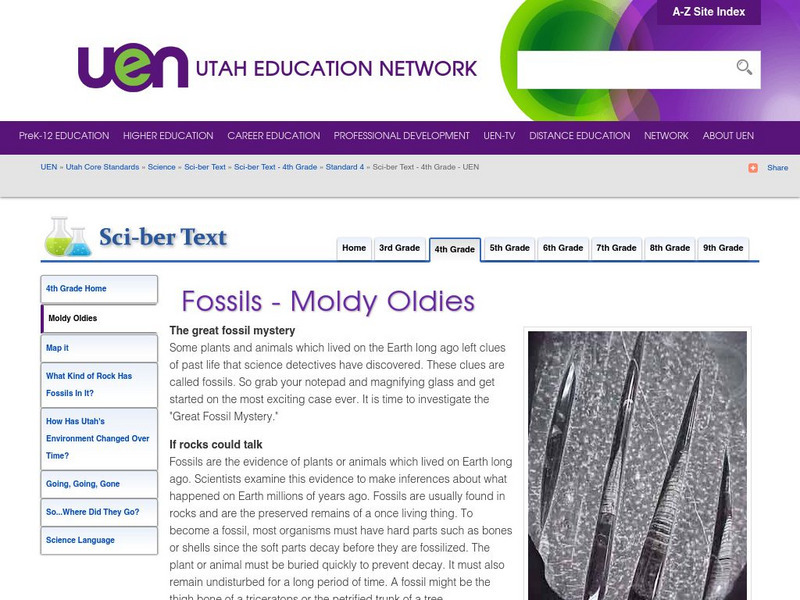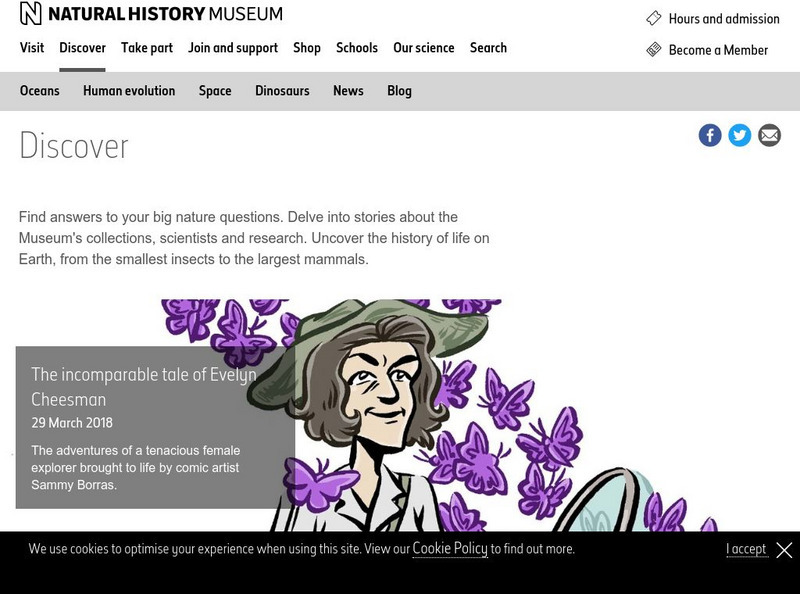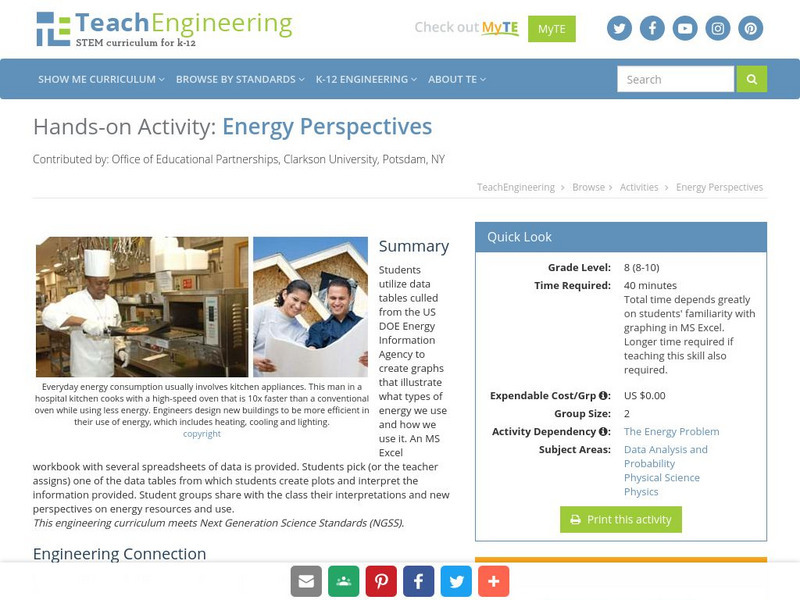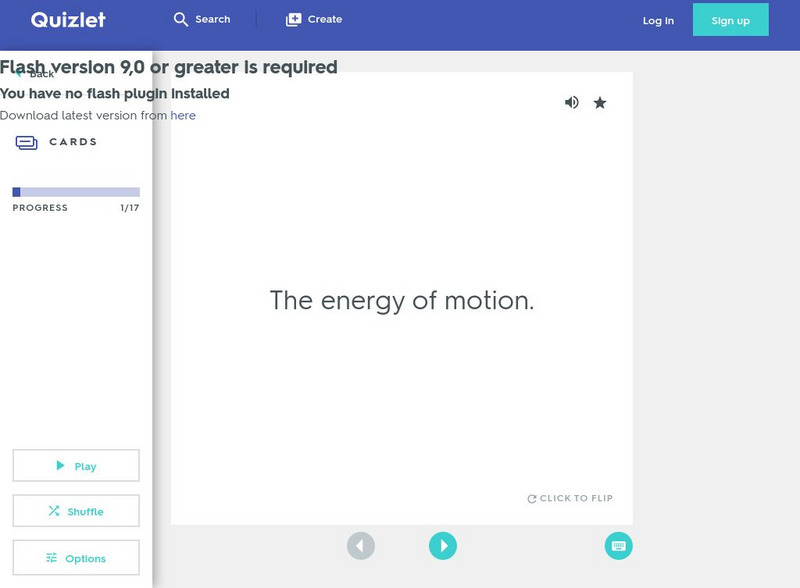Hi, what do you want to do?
Discovery Education
The Time of Our Life
Mammals are some of the newest organisms to appear on Earth. Young scholars complete an activity that results in a timeline showing the appearance of different types of living organisms. Provided with a list that spans from prokaryotes...
Texas State Energy Conservation Office
Investigation: Oil Recovery
Energy conservers investigate gravel size to discover if it impacts the amount of oil recovered in the extraction process.
Teach Engineering
Win that Bid! Selling Your Power Solution
Power up! Class members research a type of power production using a great resource featuring a real-world problem. Groups select a type of power generation and pretend that they represent an engineering firm for their chosen power type....
BBC
Walking with Dinosaurs
Breath new life into your class's study of dinosaurs with this extensive collection of materials. Offering everything from a printable T-rex mask, word searches, and connect-the-dots activities to informational handouts, hands-on...
Teach Engineering
Energy Systems
Is electricity created in the outlet? Using posters of several energy systems, collaborative groups identify and describe the parts of their systems. The groups also look at the environmental impacts of the systems and present...
Children's Museum
Children's Museum of Indianapolis: Geo Mysteries
This interactive site will engage students' curiosity as they learn about the various types of rocks and how they are formed. Also includes a fantastic timeline, showing the formation of rocks throughout history.
American Museum of Natural History
American Museum of Natural History: Living Large
This engaging game about dinosaurs allows students to analyze and interpret fossil data, as well as engage in argument from evidence. The game helps students to understand that fossils provide evidence about the types of organisms that...
Utah Education Network
Uen: Fossils Moldy Oldies
A good introduction to different types of fossils and how they form. There are also directions for making three different models of fossils.
Science Buddies
Science Buddies: Get Some Practice at 'Fossil' Reconstruction With Owl Pellets
Although this project is not based on actual fossils, you will get good practice at reconstructing an animal's skeleton from individual bones. The goal of this science project is to identify the types of prey that are consumed by owls by...
US Department of Energy
U.s. Department of Energy: Coal: Our Most Abundant Fuel
The U.S. has enough coal to last for the next 200-300 years. So why are we not using more of it? This article describes the different types or "ranks" of coal, the history, and the problems with burning coal for energy.
Children's Museum
Children's Museum of Indianapolis: Floating Rock Geo Mysteries
Did you know that there are some rocks that actually float? Follow this interactive investigation to find out which ones and why.
Natural History Museum
Natural History Museum: Shark Teeth Fossils
The information provided at this site is part of a larger online exhibit centered on fossils and fossil research. The shark tooth is listed as one type of fossil and here it is pictured and described.
Science Buddies
Science Buddies: Biodiesels: Converting Oil Into Clean Fuel
Experiment making biodiesel from different types of oil and determine which oils give the best result. This science fair project from Science Buddies, although in an abbreviated format compared to other Science Buddies experiments, gives...
Enchanted Learning
Enchanted Learning: Birds
This site from Enchanted Learning can answer your questions about birds. What type of scientist studies birds? What is the fastest running bird? Which bird lays the largest birds' eggs? Come and find out the answer to these questions and...
TeachEngineering
Teach Engineering: Energy Perspectives
Students utilize data tables culled from the US DOE Energy Information Agency to create graphs that illustrate what types of energy we use and how we use it. An MS Excel workbook with several spreadsheets of data is provided. Students...
PBS
Pbs: Where to Dig
Dinosaurs have intrigued us for many years. As we explore to learn more we need to know where to look. In which type of rock would you find dinosaur fossils? This brief interactive provides real world application for rock characterization.
Read Works
Read Works: Dig This!
[Free Registration/Login Required] An informational text about learning history by studying fossils and rocks. A question sheet is available to help students build skills in reading comprehension.
Other
The Animals Page
Provides an easy to understand overview of animals from protozoa and echinoderms to insects, mammals, birds, and fish.
Quizlet
Quizlet: 6th Grade Science: Energy Vocabulary: Flashcards
This set of interactive flashcards focuses on 17 terms related to energy and their definitions. These include the following types of energy: Kinetic, Sound, Potential, Elastic potential, Chemical, Gravitational Potential, Electrical,...
Read Works
Read Works: Dig This!
[Free Registration/Login Required] Students read different fossils, how fossils are made, and three different types of rock on Earth. A question sheet is available to help students build skills in comparing and contrasting.
Science Buddies
Science Buddies: Sorting Out Sedimentation
Sedimentary rock forms in layers that are deposited one after the other over long periods of time. Oftentimes, sedimentary rock contains fossils and other debris that are deposited within the layers. Use this experiment to investigate...
Quizlet
Quizlet: 6th Grade Science: Energy Vocabulary: Match
In this interactive game, students match 17 terms related to energy with their definitions. These include the following: Kinetic, Sound, Potential, Elastic potential, Chemical, Gravitational Potential, Electrical, Light, Energy, Energy...






















